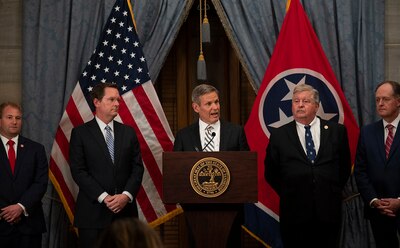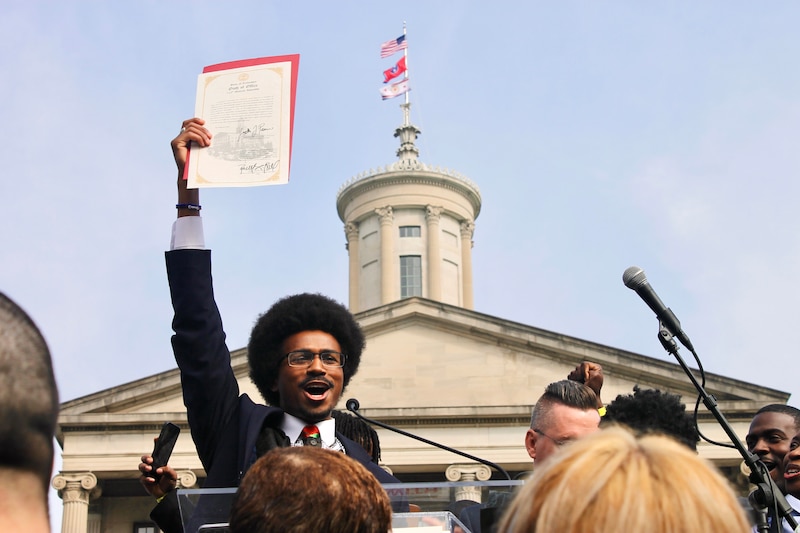Sign up for Chalkbeat Tennessee’s free daily newsletter to keep up with Memphis-Shelby County Schools and statewide education policy.
About 3,500 social studies teachers converge on Nashville this weekend for their annual national conference, but not without some pushback for meeting in a state with multiple laws aimed at classroom censorship and restrictions related to discussing race and gender.
“Some of our members have worried that this could be a hostile environment for them,” said Wesley Hedgepeth, a social studies teacher in Henrico County, Virginia, and this year’s president of the National Council for the Social Studies.
Even so, attendance is set to surpass last year’s convention in Philadelphia, the group’s first in-person gathering since the pandemic. The last pre-COVID conference, in 2019, drew about 4,000 participants to Austin, Texas.
“There have been concerns about Tennessee’s divisive-concepts law and perceived censorship by the government, as well as the suppression of certain identities,” Hedgepeth said on Thursday, the eve of the three-day conference.
“We’ve been working tirelessly to make sure this is an inclusive conference and remind people that Nashville is a welcoming place,” he said.

Under the leadership of Republican Gov. Bill Lee and the GOP-dominated legislature, Tennessee was one of the first states to impose legal limits on classroom discussions about racism and white privilege. It gave a state commission new authority to ban certain library books statewide. It also enacted restrictions on the rights of transgender students in school. One new law ensures that school and university employees can opt out of implicit-bias training.
And earlier this year, the predominantly white and older House of Representatives ousted two young Black Democratic members for the way they protested the body’s failure to pursue significant gun reforms after a shooter killed three children and three adults at a Nashville school.
Related: The ‘Tennessee 3′ made history. Will their story be taught?
Add in a 2023 state law restricting drag shows — which has since been overturned by a federal judge — and some social studies teachers from elsewhere in the nation were balking at coming to the Volunteer State.
That spurred the council, which is the nation’s premier professional organization for social studies, to issue a three-page statement this spring titled “Why Nashville?”
The paper noted that, in addition to its renowned music scene, Tennessee’s capital city is home to key moments and movements in U.S. history.
On Aug. 18, 1920, Tennessee became the 36th state to ratify the 19th Amendment to the U.S. Constitution, giving women across America the right to vote.
And in 1960, at the height of the Civil Rights Movement, a group of college students including Diane Nash formed the Student Nonviolent Coordinating Committee in Nashville. The chairman was a young John Lewis, a student at Nashville’s Fisk University, who went on to become a civil rights icon and longtime congressman from Georgia before his death in 2020.
“We remain committed to providing a safe and welcoming environment for all social studies educators to come and learn with us in Nashville,” the organization’s statement said.
The last time the group held its national conference in Tennessee was in 1993. The state’s affiliate organization submitted a 2017 pitch for a return to Nashville, and organizers soon signed contracts with local hotels and convention facilities. That was before the national racial reckoning spurred by the 2020 police murder of George Floyd in Minneapolis and a conservative backlash to subsequent anti-racism protests. Tennessee has been at the forefront of culture wars ever since.
Related: How the age-appropriate debate is altering curriculum
This spring, after the legislature expelled the two young Black Democratic members, the National Council for the Social Studies issued a four-page rebuke of the Tennessee House of Representatives. The statement called the ouster an attack on the foundational principles of democratic and republican norms and said that, intentionally or not, the state was sending its students a message that the rights to free speech, peaceful protest, and holding their elected officials accountable are “reserved for those who have a specific view or perspective.” (The two lawmakers were later reelected by their local constituents.)

The vagueness of Tennessee’s censorship laws also is having a chilling effect in classrooms and school libraries. In Memphis this fall, for instance, the co-authors of a Pulitzer Prize-winning book about Floyd were told not to talk about systemic racism during an appearance at Whitehaven High School.
“It’s like walking on eggshells,” said Laura Simmons, an eighth-grade U.S. history teacher from Bedford County, south of Nashville. “We want to give our students the information they need, including multiple viewpoints and narratives. At this point, I think most social studies teachers are just feeling out the climate of their school, their parents, and their administration.”
As president of the Tennessee Council for the Social Studies, Simmons is co-chair of this year’s national conference and helped to plan it, along with Hedgepeth, the national president. Attendees represent all 50 states, plus the District of Columbia, Puerto Rico, and nine other countries. About 10% are faculty at colleges and universities.
The 2023 conference theme is “Social Studies: Working in Harmony for a Better Tomorrow,” with sub-themes about inclusivity, elevating local narratives, and seeking partnerships beyond physical and political borders.
Featured speakers include Isabel Wilkerson, the Pulitzer Prize-winning author of “Caste” and “The Warmth of Other Suns,” and Albert Bender, a Cherokee activist, historian, political columnist, and freelance journalist. Jelani Memory, author of the bestselling “A Kids Book About Racism,” will talk about tackling difficult topics with young learners.
“We are not shying away from controversial issues,” said Simmons, a 22-year teacher in Tennessee. “Our philosophy is to make sure we’re giving our educators the things they need to best help their students.”
Ultimately, said Hedgepeth, the conference is focused on the future of social studies, which research shows is systematically marginalized in the U.S. education system, from kindergarten to college.
“This is a critical time right now, with the war in Israel and Palestine, the upcoming presidential election, and how politics have divided our country after COVID and other traumatic events,” he said. “I think we are seeing the consequences of a lack of social studies education echoing across our country — from how we relate to others to how we digest media to how we discern between what is true and false.”
“If you don’t teach social studies,” Hedgepeth said, “you don’t get those skills. It’s as simple as that.”
Marta Aldrich is a senior correspondent and covers the statehouse for Chalkbeat Tennessee. Contact her at maldrich@chalkbeat.org.






